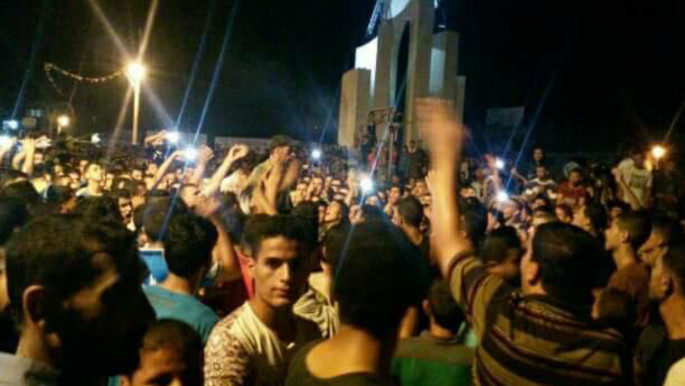Hamas vs Abbas: Keeping the lights on in Gaza
Analysis: As protests demanding electricity in Gaza continue for the third day, confusion surrounds the political targets of demonstrations, while others insist the power crisis is the key issue.
4 min read
Protesters hold their shoes outside Gaza's electricity company in a sign of defiance [Facebook]
Mass protests against the electricity company in Rafah, in the Southern Gaza Strip have now been continuing for the third day.
Such protests have been rare in Gaza - at least until recently.
The electricity situation has been worsening for months, despite very briefly improving following protests last month which culminated with the firing of the head of the lone electricity plant in Gaza.
"We don't really care who is responsible… we just want our electricity," said Ahmed L, a resident of Rafah.
However, this time around, the protests have been met with vastly different receptions depending on ideological divisions.
Against Abbas or against Hamas?
A Hamas spokesman announced on the Hamas-affiliated channel al-Aqsa TV that the protests were held against the "unity government" of Mahmoud Abbas and Rami Hamdallah, while photos of protesters burning a picture of Abbas were circulated on Facebook.
| Oh Haniyeh, oh Abbas - we want electricity, we want gas - protest chant |
Many mocked Hamas as a result. "I hope Hamas does not think these protests are a pledge of allegiance and a call for it to start a new war," tweeted one Gazan.
A video of a Hamas police officer pleading with protesters to vacate the area was also circulated, purportedly demonstrating some co-operation between Gaza security forces and the protesters.
"I have faith in your goodness," says the officer in the video. "Let us disperse this gathering, and I promise, we will put all the pressure there is in the world on [those responsible]."
Meanwhile, some in Gaza, including Fatah-affiliates, are insistent that the protests are in fact against Hamas, and that the photos of protesters burning portraits of Mahmoud Abbas were old, or carried out by a minority of protesters.
A number of young activists who were calling for the protests on Facebook - including one of the organisers behind April's short-lived protest movement for reconcilliation - were briefly detained on Monday night.
On Tuesday, the Palestinian Centre for Human Rights in Gaza issued a statement condemning sections of the police in the coastal enclave for attempting to prevent protesters from gaining access to the demonstration, beating participants and preventing journalists from covering the marches.
Although the protests are seemingly being used by both Hamas and Fatah for their own political ends, many Gazans expressed their disillusion with both.
"We in Rafah do not recognise the Abbas government, let alone protest against it," posted one Facebook user.
Over on Twitter, another wrote: "My Fatah friend, the fact that we criticise Hamas, whether because of the electricity crisis or their lies, does not mean that we can't still say f*** you to your leadership and Fatah."
Accordingly, one of the reported chants used in the protests was: "Oh Haniyeh, oh Abbas - we want electricity, we want gas."
 |
|
| Protests outside the power plant in Gaza [Facebook] |
Those who argue that Hamas holds responsibility for the power cuts say that the movement's leaders and prominant members get a privileged supply of electricity, that is not adequately distributed across Gaza.
Electricity that powers Rafah comes from Egypt, and supplies have frequently been disrupted by clashes between the Egyptian military and militants in Sinai, and Egypt's decision to further ration supplies of electricity to Gaza in March.
Electricity in Rafah is also frequently siphoned off to Khan Younis, due to the city's problems with the neighbouring Israeli supply.
The crisis worsened after the Gaza Strip's single power plant halted production in March, as it was unable to pay a tax imposed by the Palestinian Authority in the West Bank for allowing fuel to be imported to Gaza.
Power struggle
"Its about electricity. We are getting electricity for 6 hours a day," said one Gaza resident. "And even in that time it keeps cutting."
This sentiment were echoed by Ambassador Mohammed Emadi, president of the Qatari Committee for the Reconstruction of Gaza, who is currently visiting the blackaded strip.
"Why is it that every time I visit Gaza, the power goes off?" joked Emadi.
The ambassador said that if he had any criticism of Hamas, he would tell them, but he said, in this case, the responsibility lay neither with the PA nor Hamas, but with Israel.
"Israel promised that they would allow 800,000 litres of fuel but only 160,000 were allowed in," he said.
"Israel is banning the entry of the fuel, because of the Eid season….how can we run the power plant without fuel? It's not [the manager of the power plant's] fault."
The crisis has been made worse by the rising cost of fuel for generators that are often used by households during grid blackouts.
Following price hikes on all goods in Gaza after Egypt's destruction of the smuggling tunnels, the cost of a litre of oil has risen from two shekels to seven shekels ($1.80).
The Gaza Strip's only power plant is still damaged from the 2014 Gaza war, and has been struggling to produce power for months.
Emadi is reportedly in talks for a new scheme to supply gas from Israel to Gaza through a new pipeline, joint funded by the Netherlands.
While Fatah and Hamas blame each other for the crisis, residents suffer the dire consequences of living with sometimes just two hours of electricity a day.





 Follow the Middle East's top stories in English at The New Arab on Google News
Follow the Middle East's top stories in English at The New Arab on Google News


